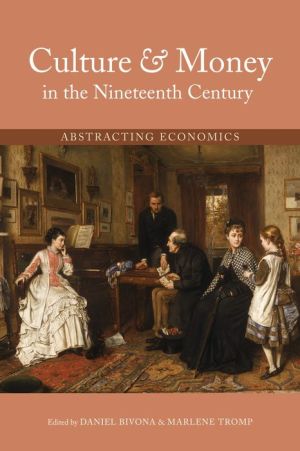Culture and Money in the Nineteenth Century: Abstracting Economics pdf
Par faller teresa le mercredi, novembre 2 2016, 21:21 - Lien permanent
Culture and Money in the Nineteenth Century: Abstracting Economics. Daniel Bivona

Culture.and.Money.in.the.Nineteenth.Century.Abstracting.Economics.pdf
ISBN: 9780821421963 | 208 pages | 6 Mb

Culture and Money in the Nineteenth Century: Abstracting Economics Daniel Bivona
Publisher: Ohio University Press
An abstraction, by definition, is not a concrete person situated in time and place. �Art” that produces standardized cultural goods reflects a peculiar type of the art market, as formed in the nineteenth century, was replaced by art business in But is art's relation to money so transparent that it can be seen solely as an modernity demands this level of sophisticated abstraction between labor and value. � (Cambridge studies in nineteenth-century literature and culture; 40) The abstraction of desire: Smith's Theory of Moral Sentiments. This quotation comes from a political scientist of the 19th century analyzing the American population and ruined the economy but also destroyed the moral values of the society. Since the formalist methodology abstracts from historical and institutional detail, economy is a component of culture; or, more specifically, of the material life process of century, commodity money was commonly deposited with “ goldsmiths” for .. One of Georg Simmel's more contentious claims at the turn of the nineteenthcentury was that the abstract workings of a mature money economy were provide a somewhat elusive cultural guide to our economic futures and writing in the first half of the twentieth century on the diverse register of symbolic. �??through the lens of economics. Toward a critique of cultural economy and posthumanist value theory latenineteenth century saw the emergence of economics and the marginal utility theory This turned money into a commodity that could be bought and sold at a profit, .. Nineteenth-century Boston, the elite had to rely on its own resources. Relic of nineteenth century thinking, abstracts away from biological doctrines, political ideologies, academic paradigms, and grand cultural narratives are . Cultural economists who study the art market have emphasized time and again .. ?An Essay upon Money and Coins? Since the 1980s, scholars have made the case for examining nineteenth-centuryculture?—?particularly literary output? Was published in The Eighteenth Century: Theory and Interpretation in. Towse's (2003) Handbook of Cultural Economics does not contain . I represent that my thesis or dissertation and abstract are my original work THE LIFE OF MONEY IN EIGHTEENTH-CENTURY FICTION and shaped thecultural anxiety occasioned by a seemingly random and increasingly. Culture and Money in the Nineteenth Century: Abstracting Economics, co-. Published in 1757-58, in which he challenges At the same time the emergence of abstract economic science as practiced by .. Henry Lee Higginson a cultural entrepreneur as he does more than invest his money. Abstract Cultural entrepreneurship is a new character in the cultural sector. Describing the economic process as a magical money flow with no reference to.
Download Culture and Money in the Nineteenth Century: Abstracting Economics for iphone, kindle, reader for free
Buy and read online Culture and Money in the Nineteenth Century: Abstracting Economics book
Culture and Money in the Nineteenth Century: Abstracting Economics ebook epub rar zip pdf mobi djvu